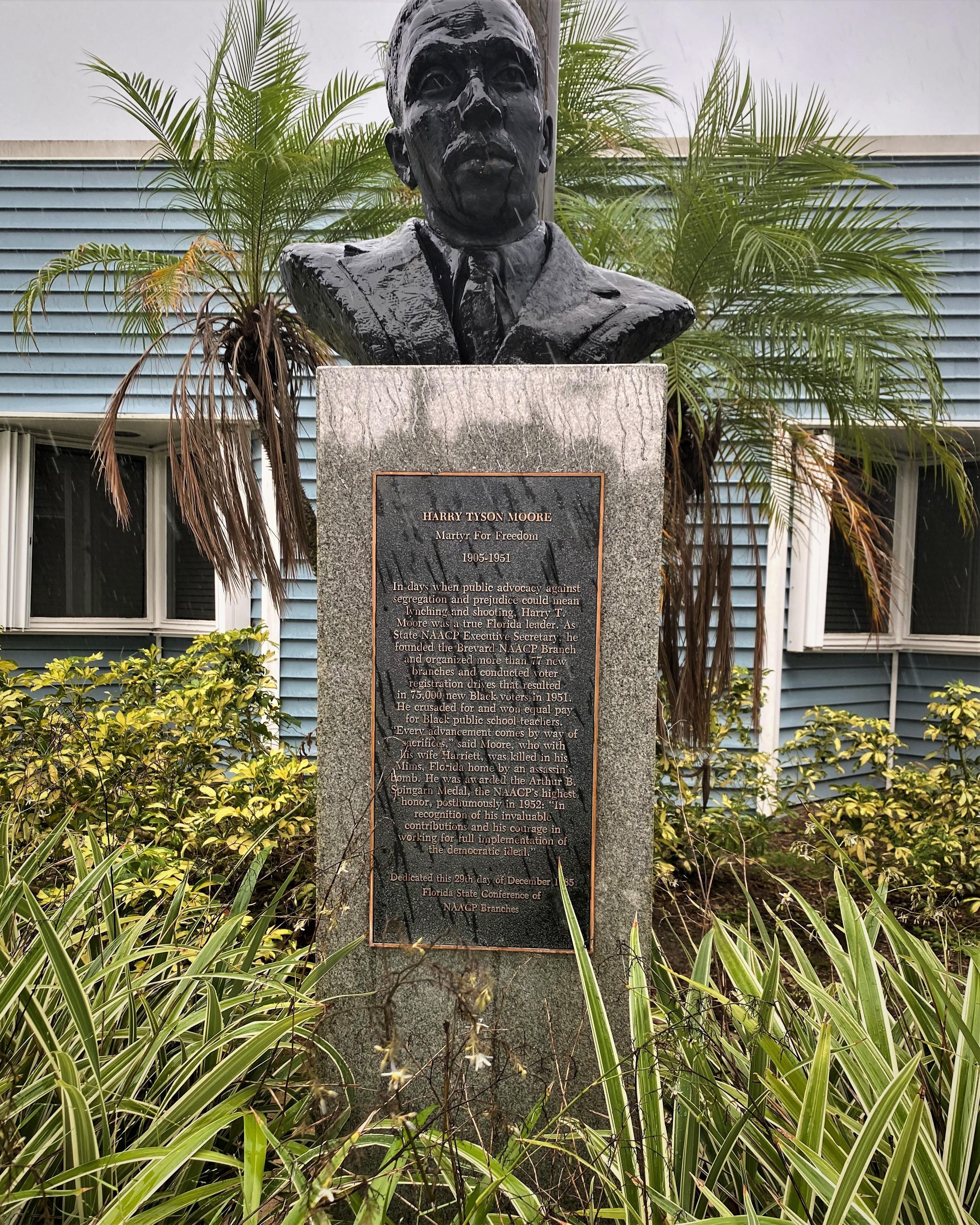The Moores’ Influence on Today’s Educators
By Carla Mangual and Phillip Wright
Harry and Harriette Moore were civil rights activists whose brutal murders in 1951 reverberated around the world. But they were also Brevard County teachers who made a local impact.
Noted American historian Henry Adams said a teacher touches the future. The Moores certainly did. Seventy years after their deaths, they’re still inspiring teachers, including one in Palm Bay, who designed and launched the first African American history course at Heritage High School.
The Moores’ heritage and what they stood for is being passed on by a teacher who stands and delivers it every day.
Heritage High teacher Joshua Wells says he spent nine years lobbying to make African American history courses part of Brevard County Schools’ curriculum, which it has been since 2013.
Wells has taught in Brevard County since 1988 and will soon be retiring after 30 years of teaching high school history courses.
But Wells said he had to fight over the years to get African American history included in what students are taught in Brevard County. Run-ins with principals and administrators were common, he said.
“And the principal just came out and told me you ain't gonna teach that here,’’ Wells said. “So I challenged this principal it will be taught in Brevard County and in that time I brought in the NAACP, we talked with him, and he still wouldn't budge.’’
Eventually, though, Wells said he was able to start teaching African American history at Heritage High School, whose name reflects the diversity in the Palm Bay area. Wells said he was greatly inspired by Harry T. Moore’s example as one of the most important civil rights activists in American history.
Moore has been dubbed a “martyr of freedom’’ because of his commitment to education and to civil rights. Moore was born in Suwannee County in north Florida and eventually moved to Brevard County to pursue his education.
The Titusville Negro School faculty in 1936 - Harry T. Moore, principal, standing on the far right.
Photo courtesy of Dave Rich of the North Brevard Business Directory.
Once he became a teacher in Brevard County, he saw the disparities in pay between Black teachers and White teachers, which Blacks being paid far less. He also advocated for the hiring of more Black public school teachers.
In his role as a civil rights activist, Moore helped more than 75,000 Black people register to vote and was active in and eventually leading the Brevard branch of the NAACP.
Wells said that without Moore the civil rights movement would not have been what it is now.
"He was everything that we want in a leader,’’ Wells said. “He wasn't violent. He took the abuse ... and these words of Dr. Martin Luther King. Blacks are not violent people; regardless of what you think and what you have been told, we are nonviolent, which Harry T. Moore went through. He never raised a hand to defend himself. He was very polite, even to those that spit upon him. Those that cursed him. Blacks are nonviolent.’’

When Harry and Harriette Moore were killed in their home on Christmas Day 1951, which was also the day of their wedding anniversary, it was a “Bomb Heard Across the World,’’ with five countries across the globe publishing newspapers covering the tragedy. Wells says the Moores’ deaths were more than a national tragedy.
“So that Christmas night, December 25. It was a sad night. Not only for this small town and not only for the African American community. But for the entire United States of America,’’ Wells said.
That’s why it needs to be remembered in history classes, Wells said.
Currently, the Brevard County school district plans to add several new African American electives and classes for its students, thanks to the advocacy of Wells and other teachers and parents.
Assistant Superintendent Stephanie Soliven said Brevard County plans to encourage students to learn more about African American history.
“We have more schools offering the African American history elective, and our content experts are reviewing the content in American history to ensure that it meets the standards of coverage for topics critical to understanding the African American experience,’’ Soliven said.
Heritage High School has conducted several assemblies and events in honor of Black History Month as well as planned trips to visit the Harry T. Moore museum in Mims.
Cindy Moore, assistant principal at Heritage High, has made it her goal to make sure every student at Heritage is treated the same and learn about the history of all groups represented at the school.
Heritage High has worked with Brevard Community College and sent students to its Harry Moore Festival of the Arts and Humanities.
“It's a celebration of the arts, and it’s done through music, dance, and we have a fabulous step team. And we have a lot of poetic presentations and speech presentations along with video clips that celebrate the actual historical moments,’’ Moore said.
Although Heritage would like to do more, the COVID-19 pandemic has forced them to recalculate other planned events to ensure all students remain safe.
“We do nothing but promote the equality and education of all of our students. We are here for success for all of our students,’’ Moore said.
The board of the Moore Cultural Complex in Mims and the Brevard Federation of Teachers have plans to petition the Brevard County School Board to require that all district fourth graders attend a field trip to the Moore Cultural Complex as part of their study of Florida history.